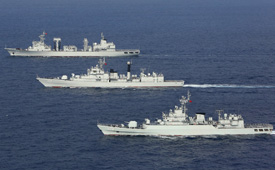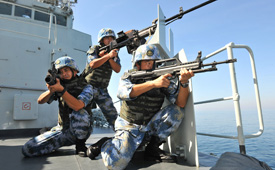|
 |
 |
|
NAVAL FORCE: Warships of the 14th Chinese escort taskforce on their way to the Gulf of Aden on March 1 |
REGULAR DRILL: Special forces soldiers of the naval escort taskforce rehearse hijacking rescue operations |
The Gulf of Aden is one of the world's busiest sea lanes, with 20 percent of the world's sea trade passing through it. Every year, around 20,000 oil tankers, freighters and merchant vessels pass through this crucial route between the Indian Ocean and the Red Sea.
South of it on the Horn of Africa is Somalia, a country that has been plagued by more than 20 years of domestic strife. Sustained chaos has deprived local people of materials for basic living, which in turn fueled a "piracy industry" for people struggling to survive.
As a result, passing merchant ships and even vessels carrying humanitarian relief items increasingly fell victim to pirate attacks. Rampant piracy posed threats to both crews' physical safety and trade security.
In response, since June 2008, the UN Security Council has adopted several resolutions authorizing counter-piracy operations off the Somali coast. The Transitional Federal Government of the Somali Republic also appealed for international assistance.
From January to November of 2008, pirates attacked 20 percent of the 1,200 or so Chinese ships passing through this area, and hijacked five merchant ships between 2007 and 2008.
To protect Chinese ships as well as ships delivering humanitarian relief items, and with the full awareness that anyone involved in world trade has a responsibility to protect vital trade routes, in December 2008, the Chinese Government, in light of UN resolutions and the practices of relevant countries, decided to dispatch three warships to the Gulf of Aden and waters off Somalia for an escort mission.
Continuous escort
On December 26, 2008, the first-ever Chinese naval escort task group (ETG169), comprising the CNS Wuhan (DDG), Haikou (DDG) and Weishanhu (AO), departed from Sanya in China's southernmost Hainan Province toward the Gulf of Aden about 4,400 nautical miles away. It joined a multinational naval force already patrolling the area, including vessels from the EU, NATO, the United States, Russia and India. What the Chinese navy begins to get engaged in is in effect an international peacekeeping operation.
The Chinese Government has dispatched 37 warships and some 10,000 naval personnel in 14 groups to the Gulf of Aden and waters off Somalia without interruption during a period exceeding four years. Chinese naval forces have successfully escorted more than 5,200 vessels in the area, among which more than 50 percent were from other countries.
The CNS Harbin (DDG), Mianyang (FFG) and Weishanhu (AO) of the 14th Chinese naval escort task group (ETG112) set sail from Qingdao in Shandong Province in mid-February and reached the Gulf of Aden to undertake patrols in early March. The task group has a combined crew of 730 personnel and had successfully escorted 156 Chinese and foreign ships in 54 convoy groups by late July.
As the deputy commander of the task group's special operation forces team, Lieutenant Zeng Xiaosong has participated in a number of onboard security operations. He recalled a particularly intense bout of seasickness aboard a 30-meter fishing boat tossed about at night by 3- to 4-meter swells.
"We feel satisfied with what we have done, especially when the seamen on the fishing boats enthusiastically told us that the presence of Chinese naval special forces on their boats filled them with a sense of safety," said Zeng.
| 